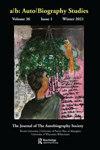可以笑吗?创伤,回忆录和教学播客妈妈说我的回忆录是一个谎言
Q1 Arts and Humanities
引用次数: 0
摘要
在2017年的播客“妈妈说我的回忆录是谎言”中,作家兼喜剧演员罗西·沃特兰一章一章地向母亲朗读她的畅销回忆录《反酷女孩》(2015)。在罗西阅读和她母亲回应的过程中,播客模仿并颠覆了一些对童年创伤回忆录的更持久的批评。本文讨论了作者在当代生活写作本科课程中,将沃特兰的播客作为固定文本进行教学的经验。沃特兰对创伤童年的描述符合21世纪用来描述(大多是贬义的)生活叙事的创伤文本或苦难文学的主要修辞。然而,作为一部幽默的回忆录,播客也运用了情感域和喜剧策略,旨在动摇或解除读者的期望,提高批判性素养。在讨论《妈妈说我的回忆录是谎言》的教学过程中,作者探讨了真理、记忆、伦理和真实性等基本学术问题。作为一个播客,文本也引起了人们对媒介和调解的关注,这是核心。倾听的行为将学生置于播客中罗西母亲丽莎(Lisa)所处的主体位置。倾听的伦理,或者面对创伤和证词时的责任问题,可能在这里被框定?播客如何成为这种参与的重要或独特的媒介?本文章由计算机程序翻译,如有差异,请以英文原文为准。
Okay to Laugh? Trauma, Memoir, and Teaching the Podcast Mum Says My Memoir Is a Lie
Abstract In her 2017 podcast Mum Says My Memoir Is a Lie, the author and comedian Rosie Waterland reads aloud her bestselling memoir, The Anti-Cool Girl (2015), chapter by chapter to her mother. As Rosie reads and her mother responds, the podcast mimics and destabilizes some of the more persistent critiques that have attended memoirs of traumatic childhood. This essay discusses the authors’ experience teaching Waterland’s podcast as a set text in an undergraduate course on contemporary life writing. Waterland’s account of a traumatic childhood fits to the dominant tropes of trauma text or misery lit that have been used to describe (mostly pejoratively) life narrative in the twenty-first century. However, as a humorous memoir, the podcast also works with affective registers and comic strategies that are designed to unsettle or disarm reader expectations and heighten critical literacy. In discussing teaching Mum Says My Memoir Is a Lie, the authors address foundational scholarly issues of truth, memory, ethics, and authenticity. As a podcast, the text also draws attention to medium and mediation, which are central. The act of listening places the student in a subject position that is inhabited in the podcast by Rosie’s mother, Lisa. What ethics of listening, or questions of responsibility in the face of trauma and testimony, might be framed here? And how might the podcast be a significant or unique medium for this kind of engagement?
求助全文
通过发布文献求助,成功后即可免费获取论文全文。
去求助
来源期刊

a/b: Auto/Biography Studies
Arts and Humanities-Literature and Literary Theory
CiteScore
0.80
自引率
0.00%
发文量
27
期刊介绍:
a /b: Auto/Biography Studies enjoys an international reputation for publishing the highest level of peer-reviewed scholarship in the fields of autobiography, biography, life narrative, and identity studies. a/b draws from a diverse community of global scholars to publish essays that further the scholarly discourse on historic and contemporary auto/biographical narratives. For over thirty years, the journal has pushed ongoing conversations in the field in new directions and charted an innovative path into interdisciplinary and multimodal narrative analysis. The journal accepts submissions of scholarly essays, review essays, and book reviews of critical and theoretical texts as well as proposals for special issues and essay clusters. Submissions are subject to initial appraisal by the editors, and, if found suitable for further consideration, to independent, anonymous peer review.
 求助内容:
求助内容: 应助结果提醒方式:
应助结果提醒方式:


